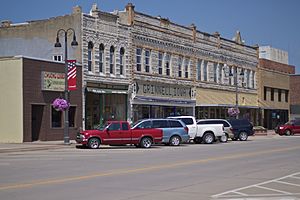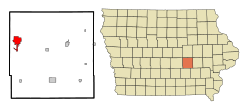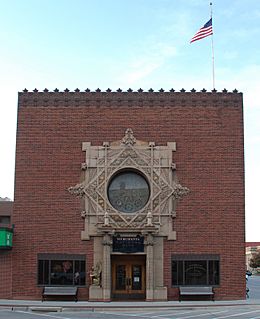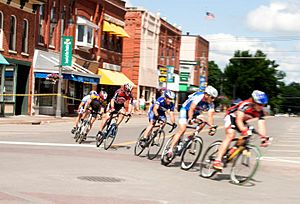Grinnell, Iowa facts for kids
Quick facts for kids
Grinnell, Iowa
|
|
|---|---|

Downtown Grinnell
|
|
| Motto(s):
"Jewel of the Prairie"
|
|

Location of Grinnell, Iowa
|
|
| Country | |
| State | |
| County | Poweshiek |
| Area | |
| • Total | 5.73 sq mi (14.84 km2) |
| • Land | 5.69 sq mi (14.74 km2) |
| • Water | 0.04 sq mi (0.11 km2) |
| Elevation | 1,014 ft (309 m) |
| Population
(2020)
|
|
| • Total | 9,564 |
| • Density | 1,681.14/sq mi (649.06/km2) |
| Time zone | UTC−6 (Central (CST)) |
| • Summer (DST) | UTC−5 (CDT) |
| ZIP Codes |
50112, 50177
|
| Area code(s) | 641 |
| FIPS code | 19-33105 |
| GNIS feature ID | 0457150 |

Architect: Louis Sullivan
Grinnell is a city in Poweshiek County, Iowa, United States. The population was 9,564 at the time of the 2020 census. It is best known for being home of Grinnell College.
Contents
History
Grinnell was founded as a "Yankee" settlement, that is to say it was founded and originally settled by settlers from New England (as well as those from upstate New York whose parents and grandparents had come to that region from New England) who were descended from the English Puritans who settled New England in the 1600s. Grinnell was founded in 1854 by Josiah B. Grinnell a Congregationalist from Vermont. The city was originally slated to be named "Stella," but J.B. Grinnell convinced other members of the colony to adopt his own name for the city, citing it as a rare and concise name. Grinnell was incorporated on April 28, 1865, and by 1880 Grinnell had a population of around 2000. Located at the junction of two railway lines (east-west line of the Rock Island Railroad and the north-south Minneapolis and St. Louis Railway), it became and remains the largest community in Poweshiek County.
Grinnell was a stop on the Underground Railroad. One of the most famous events occurred in February 1859, when John Brown, a strong abolitionist, and 12 slaves he was helping escape to freedom, were hosted by J.B. Grinnell and several other community residents. Because of J.B.'s efforts to help slaves and end slavery, in 2013 the National Park Service included his gravesite at Hazelwood Cemetery on the National Underground Railroad Network to Freedom listings.
Grinnell was also a stop along the (Mormon) Pioneer Trail, which spans across five states covering about 1,300 miles. The trail was traveled by an estimated 100,000 plus travelers from 1846 to 1869, including some 70,000 Mormons escaping religious persecution. The Pioneer Company of 1846-1847 established the first route; from Nauvoo, Illinois to Salt Lake City, Utah. Today, the Pioneer Trail is still visible through many parts of rural Grinnell.
Grinnell is home to Grinnell College, established in 1846. In 1889, Grinnell College and the University of Iowa played each other at Grinnell College in the first football game played west of the Mississippi River. On June 17, 1882, a tornado destroyed most of the college campus and much of the community with a death toll of 68. In 1889 fire destroyed most of the downtown area. Grinnell College is nationally recognized as a leading undergraduate institution. In July 2006, The New York Times included Grinnell in its profile of the 20 colleges and universities of "established or rising scholarship" which are fast becoming viable alternatives to Ivy League institutions, and is considered one of the 30 Hidden Ivies.
Grinnell was home to Spaulding Manufacturing. H.W. Spaulding began making carriages and spring wagons in Grinnell, Iowa in 1876. In 1909 the Spaulding Manufacturing Company added automobiles to its production line. At one time, the factory was the largest employer in the county. The Spaulding factory site became home to the Spaulding Center for Transportation/Iowa Transportation Museum.
Geography
According to the United States Census Bureau, the city has a total area of 5.64 square miles (14.61 km2), of which 5.60 square miles (14.50 km2) is land and 0.04 square miles (0.10 km2) is water.
Climate
Grinnell has a humid continental climate with clear seasons, hot, humid summers, and cold, snowy winters. The precipitation averages 36.07 in (916 mm) yearly. Summers are the rainiest times of year, with over two thirds of the precipitation falling between April and September in an average year.
Demographics
| Historical population | |||
|---|---|---|---|
| Census | Pop. | %± | |
| 1860 | 392 | — | |
| 1870 | 1,482 | 278.1% | |
| 1880 | 2,415 | 63.0% | |
| 1890 | 3,332 | 38.0% | |
| 1900 | 3,856 | 15.7% | |
| 1910 | 5,036 | 30.6% | |
| 1920 | 5,362 | 6.5% | |
| 1930 | 4,949 | −7.7% | |
| 1940 | 5,219 | 5.5% | |
| 1950 | 6,828 | 30.8% | |
| 1960 | 7,367 | 7.9% | |
| 1970 | 8,402 | 14.0% | |
| 1980 | 8,868 | 5.5% | |
| 1990 | 8,902 | 0.4% | |
| 2000 | 9,105 | 2.3% | |
| 2010 | 9,218 | 1.2% | |
| 2020 | 9,564 | 3.8% | |
| Iowa Data Center | |||
2010 census
As of the census of 2010, there were 9,218 people, 3,567 households, and 2,026 families residing in the city. The population density was 1,646.1 inhabitants per square mile (635.6/km2). There were 3,844 housing units at an average density of 686.4 per square mile (265.0/km2). The racial makeup of the city was 91.9% White, 2.0% African American, 0.3% Native American, 2.7% Asian, 0.2% Pacific Islander, 0.8% from other races, and 2.1% from two or more races. Hispanic or Latino of any race were 3.2% of the population.
There were 3,567 households, of which 27.1% had children under the age of 18 living with them, 43.4% were married couples living together, 10.4% had a female householder with no husband present, 3.0% had a male householder with no wife present, and 43.2% were non-families. Of all households 36.8% were made up of individuals, and 16.4% had someone living alone who was 65 years of age or older. The average household size was 2.16 and the average family size was 2.82.
The median age in the city was 35.6 years. 19% of residents were under the age of 18; 21.4% were between the ages of 18 and 24; 18.4% were from 25 to 44; 21.9% were from 45 to 64; and 19.1% were 65 years of age or older. The gender makeup of the city was 47.3% male and 52.7% female.
Arts and culture
Arts
The Grinnell Area Arts Council (GAAC) began in 1979 and sponsors many of the creative projects in Grinnell, including various community theater plays, the community band and a summer arts camp. Each season, the GAAC offers a variety of different classes including theater classes, crafts classes, and language classes. GAAC also sponsors various events throughout the year, such as Music in the Park, a free event offered to community members. The Turlach Ur bagpipe band is also a program of GAAC. The Grinnell Arts Center is housed in the renovated old library building. It include a gallery on the main floor and a small theater performance space on the top level.
The Faulconer Gallery at Grinnell College showcases exhibitions of regional, national, and internationally esteemed artists in a 7,400 square feet state-of-the-art museum space situated in the heart of Grinnell College's Bucksbaum Center for the Arts. Exhibitions by members of the Grinnell College art faculty can be seen throughout the year, and in May, the annual Student Art Salon features student work.
Architecture
Grinnell has several notable architectural landmarks: Among them, include the Merchants' National Bank designed by architect Louis Sullivan in 1914. The bank is one in a series of small banks designed in the Midwest. The Ricker House was designed by Walter Burley Griffin Marion Mahony Griffin in 1911 and completed in 1912. It was the first of seven houses the Griffins designed for Iowa clients, six of which were built and the other five of which are in Mason City. Ricker House was purchased by Grinnell College in 2000 and is operated as a short-term residence for guests of the College.
- See Also: National Register of Historic Places listings in Poweshiek County, Iowa for more listings
Festivals and events
Grinnell Farmers Market features locally-grown produce, freshly baked goods, honey, james, plants and flowers, and handmade crafts. The market runs from May 16 through October 26 on Thursday and Saturdays. It is located in Grinnell's Central Park, located at 833 4th Avenue.
Grinnell Games is a weekend family sports festival. Community-organized events include Imagine Grinnell's Half Marathon and 5K Run, the Twilight Bike Criterium, The Amazing Chase, Twilight Trail Run, and the Warrior Run. Grinnell Games draws visitors from across the state with its family-friendly activities, sidewalk sales, live music, and a beer garden on Saturday night.
Media
The Grinnell Herald-Register is a semi-weekly newspaper in Grinnell, Iowa. It was formed February 13, 1936 after the merger of the Grinnell Herald and Grinnell Register. The Herald was founded on August 16, 1871 as a semi-weekly newspaper, and the Register was founded in 1888. The Grinnell Herald, in turn, was founded as the Poweshiek County Herald on March 18, 1868.[4]
The Poweshiek County Chronicle Republican – often referred to as the Poweshiek County CR or simply The CR – was created in January 2009 as the result of a merger of two newspapers serving other communities in Poweshiek County, the Brooklyn Chronicle and the Montezuma Republican; the Pennysaver, a shopper that had operated in Grinnell, continued, and the new newspaper began incorporating Grinnell news along with its existing coverage of rural Poweshiek County and its communities.
Radio
FM
| Freq | Call | Owner | Start | ERP (W) | Nickname | Format | RDS | HD |
|---|---|---|---|---|---|---|---|---|
| 88.5 | KDIC | Grinnell College Trustees of Iowa | 1968 | 130 | 88.5 The Robot | College/Variety | ||
| 106.7 | KRTI | Newton License Co, LLC | 1993 | 50,000 | Energy 106.7 | Hot AC |
AM
| Freq | Call | Owner | Start | Day Power (W) | Night Power | Nickname | Format | Stereo | HD |
|---|---|---|---|---|---|---|---|---|---|
| 1410 | KGRN | Grinnell License Co, LLC | 1957 | 500 | 47 | AM 1410 Stereo | Full Service, adult contemporary | Yes | No |
Community Organizations
The Imagine Grinnell Foundation is a small, grassroots foundation that focuses on quality of life issues, such as a healthy and sustainable environment, that complement economic efforts.
The Claude & Dolly Ahrens Foundation provides space and office support for the Greater Poweshiek Community Foundation, the Imagine Grinnell Foundation, and other foundations that are sheltered under the Greater Poweshiek Community Foundation umbrella. The Ahrens Foundation focuses on quality of life, health, and parks and recreation through overseeing its own property and collaborating with partner institutions.
The Greater Poweshiek Community Foundation serves as an umbrella organization for smaller nonprofits in the Grinnell area, and helps with their financial management.
Mid Iowa Community Action is a private nonprofit that seeks to help those affected by poverty.
The Grinnell Area Arts Council encourages artistic expression at the Grinnell Art Center and throughout the community.
In Popular Culture
- Robert A. Heinlein's 1951 novel The Puppet Masters begins with government agents attempting to investigate an alien ship that landed near Grinnell, Iowa.
Economy
In addition to Grinnell College, other major employers include Grinnell Mutual Reinsurance Company, Grinnell Regional Medical Center, JELD-WEN and Brownell's.
Downtown renovations
In the spring of 2005, Grinnell embarked upon a renovation project to make its downtown area more inviting. It encompassed new water mains, restoration of two-way traffic flow, brick crosswalks in the middle of each block, and more uniform parking spaces in front of downtown businesses. A median strip at each intersection was designed with Grinnell's distinctive Jewel Box pattern. Infrastructure upgrades and aesthetic renovations were also planned for the southern section of the downtown area, to include Commercial Street. Downtown street improvements have continued and as of 2016 nearly all downtown streets have been redone. Improvements have been made to many business facades. Central Park underwent a major makeover during the summer of 2016, relocating the gazebo and adding a bandstand, public restrooms, and a large group picnic enclosure. In September 2017, Grinnell's first independently owned, boutique hotel (Hotel Grinnell) opened downtown across from Central Park giving visitors luxury accommodations.
Retirement communities
Grinnell is home to two growing retirement communities, the Mayflower community in the middle of town and Seeland Park on the eastern edge. Both communities include housing options for independent living, including duplexes and apartments, and also assisted living accommodations.
Transportation
Highways
 Interstate 80 to Davenport and Des Moines
Interstate 80 to Davenport and Des Moines U.S. Route 6 to Iowa City and Des Moines
U.S. Route 6 to Iowa City and Des Moines Iowa Highway 146 to Le Grand and New Sharon
Iowa Highway 146 to Le Grand and New Sharon
Rail
Grinnell is served by two freight-only railroad lines:
- Union Pacific Oskaloosa Subdivision from Marshalltown to Eddyville
- Iowa Interstate Railroad mainline from Council Bluffs to Bureau Junction, Illinois, and on to Chicago
The two lines meet in a diamond near The Peppertree at the Depot Crossing, a railroad-themed restaurant. The Union Pacific line sees 3 trains per day while the IAIS line sees about 2 trains per day.
Airport
The Grinnell Regional Airport, also known as Billy Robinson Field, is a city-owned airport located within city limits about 2 miles south of the town center. The airport provides private and charter flights, and saw an average of 114 aircraft operations per week during 2019.
Notable people
- John O. Bailey (1880–1959), judge and politician who served as the Chief Justice of the Oregon Supreme Court, was born in Grinnell and attended local schools before enrolling at Harvard University.
- Bruce Braley (born 1957), former member of the U.S. House of Representatives for Iowa's 1st congressional district, was born in Grinnell.
- Pete Brownell (born 1969), CEO of Brownell's Inc. and President of the NRA from May 2017 to May 2018.
- Cornelia Clarke (1884-1936), nature photographer
- Jeff Criswell (born 1964), offensive lineman who played twelve seasons in the National Football League, was born in Grinnell.
- Kirby Criswell (born 1957), linebacker who played two seasons in the National Football League, was born and raised in Grinnell and attended Grinnell High School.
- John Darnielle (born 1967), musician and novelist, the main creative force behind The Mountain Goats.
- Josiah Bushnell Grinnell (1821–1891), city founder and abolitionist to whom Horace Greeley is quoted as having said: "Go West, young man, go West." This story is almost certainly apocryphal, as Greeley claimed that he never said those words to anyone.
- Danai Gurira, actress, known for her role as Michonne in the hit television series The Walking Dead and as Okoye in the Marvel Cinematic Universe.
- Hallie Flanagan (1890–1969), Federal Theater Project head, grew up in Grinnell and also attended Grinnell College.
- Harry Hopkins (1890–1946), one of President Franklin D. Roosevelt's advisors and New Deal architect, lived in Grinnell as a teenager before attending Grinnell College.
- Joe Lacina (born 1985), artist.
- Helen Lemme (1904–1968), civil rights advocate.
- David R. Nagle (born 1943), Democratic member of the U.S. House of Representatives from 1987 to 1993, was born in Grinnell.
- Robert Noyce (1927–1990), physicist and inventor who co-founded Fairchild Semiconductor and Intel Corporation, he grew up in Grinnell and attended Grinnell College.
- Bernard E. Pedersen (1925–1996), Illinois businessman and legislator, was born in Grinnell.
- Billy Robinson (1884–1916), pioneer aviator, moved to Grinnell at the age of 12.
See also
 In Spanish: Grinnell (Iowa) para niños
In Spanish: Grinnell (Iowa) para niños



